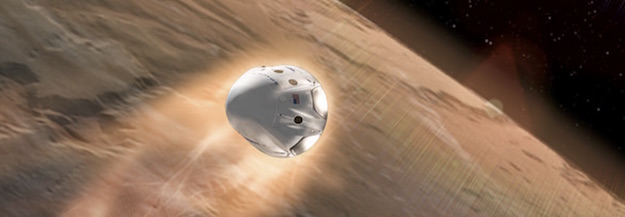Elon Musk outlined his technical roadmap for getting to Mars in a remarkable hour and a half long presentation at the International Astronautical Congress in Guadalajara, Mexico on Tuesday. Most of what’s been written about it has focused on two themes: the need for a back-up planet in case something catastrophic happens on Earth and the $200,000 ticket price for a ride to Mars. The latter isn’t exactly accurate, and the former is not Musk’s reason for doing it.
He stressed that it’s about adventure and the innate satisfaction of taming a new frontier, and the people who go will be driven by their own visions and dreams…
The goal of SpaceX is really to build a transport system. It’s like building the Union Pacific railroad, and once that transport system is built, then there’s a tremendous opportunity for anyone who wants to go to Mars and create something new or build the foundations of a new planet. So, it’s like who wants to be among the founding members of a new planet and build everything from iron refineries to the first pizza joint? We’ll want them all.
His business model is a physical version of the online economy written on a grand scale. He’ll provide the Interplanetary Transportation System to move people and their possessions to Mars and beyond; everything else is up to them.
Which is why the media focus on the $200,000 ticket price is misleading. Musk made it clear he’s not offering a package holiday. His responsibility ends on arrival. Mars colonists will have to figure out what to bring, how to pay for it and support it across millions of kilometers, and what to do with it once they get there.
Which is exactly how it should be. Different people will try different things, and some will live and some will die. Some will struggle on the edge of extinction and some will make their fortunes. The stakes are higher than in the dot-com world, where a failed business plan is just bragging rights on a resume, but the principle is the same. It’s also the same principle that drove colonisation of the Americas – some settlements were completely lost and others barely survived. Even the Massachusetts Bay colony of Mayflower fame suffered a 50% death rate its first year. And there won’t be a friendly Indian tribe to help Mars colonists. Probably.
The first SpaceX flight to Mars will be in two years, using rockets and spacecraft that are already in service and taking payloads for hire. The new ITS, which can deliver 100 people to Mars and return, will fly in about ten years, if all goes well. Musk isn’t interested in selecting who goes, except that he wants to go himself eventually. Anyone with the cash can buy a seat, and there’s only one qualification.
“The risk of fatality will be high”, Musk said. “Are you prepared to die? Then that’s ok, then you’re a candidate for going”.
Click to download Musk’s presentation deck
Video of Musk’s presentation
Full video with Q&A session

